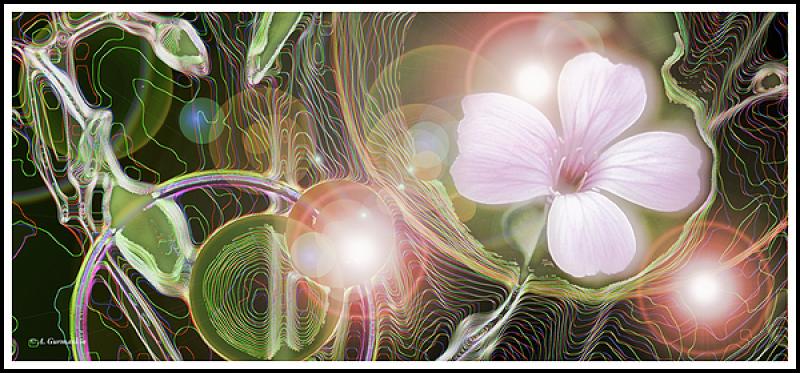But It's So Not Like Me …

"The Role of Presupposition in the Perception of Art"
That's the title of the thesis I wrote (and defended) for my graduate degree in Art History/Fine Art; on my first serious exposure to "art," mostly painting, I often questioned 'what the hell "abstract" artists were trying to accomplish'."
In retrospect, I think I thought anything referred to as "Art," in order to qualify, had to be "representational," that is …
" … relating to or denoting art the depiction of the physical appearance of things "
… that, contrasted with abstract … " … art that does not attempt to represent external reality, but seeks to achieve its effect using shapes, forms, colors, and textures".
While writing my thesis, I cannot honestly say that I came to "like" so-called "abstract paintings," but I can say, I came to appreciate the apparent spontaneity and the "freedom" for one to paint whatever the hell one feels like painting without a worry about that someone like my (former) self with my "presuppositions," might biased, and, foolishly, question its right-to-call-itself "Art."
Having admitted this, I will also admit that in recent years, I do experiment in creating imagery that moves in the direction of "abstract" art without going all the way to it. And now that I've come clean, today, I did this …

I await to learn, where … if anywhere … your "presuppositions" allow you to go, or, if they hold you back.


Be honest … positive or negative …
I've never been drawn towards abstract art. For example, although Jackson Pollock may have known what it was he was depicting, nobody else would unless he hinted in the title, but most would have differing interpretations of his works. I've seen finger painting done by monkeys and toddlers that compare. However, I can appreciate artists such as Dali, Chagall, Van Gogh and Norval Morrisseau, because I can comprehend what they have done, and in many cases the emotions that they have inserted into their art. On the other hand the representations by the realists, like Constable, may be impressive for their technical accuracy, but where are the feelings?
I very much like the artwork (it's more than just a mere photograph) that you posted here, and in an amateurish attempt to follow your example, I post this:
Pollack's art was exactly what it was … the allowing of paint and its application to be the "subject." In fact, at one point, as Pollock started to get away from that, his manager admonished him for moving toward "CONTENT!"
chacun à son goût
"Taste" might be a synonym for "presupposition" in this case.
Crikey. It has been so long since my thesis in fine art I cannot recall what the hell it was about. No doubt a defense of figurative and narrative art. I am sure cartooning figured in there somehow as I refused to show work unless my pen and ink cartoons were included in the thesis show.
When I was in Art School the majority of instructors were steeped in the abstract expressionism school and had a hearty disdain for figurative and narrative painters. Fine cartooning was considered blasphemy. It was all out intellectual warfare for 4 years. Luckily there were teachers sympathetic and helpful so the entire experience gets more of a thumbs up than disappointment and waste of money. Quite a bit of independent study with great assistance and support from a few.
I feel the same way then about abstraction in art as I do now. It doesn't really rev my gears but is a valid and important school of art. In reality all 2D art is abstraction in one way or the other.